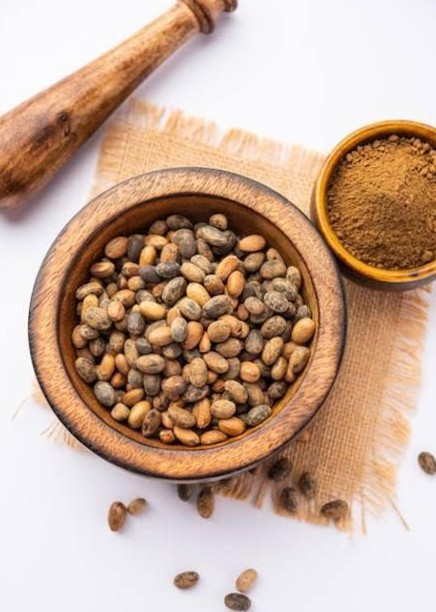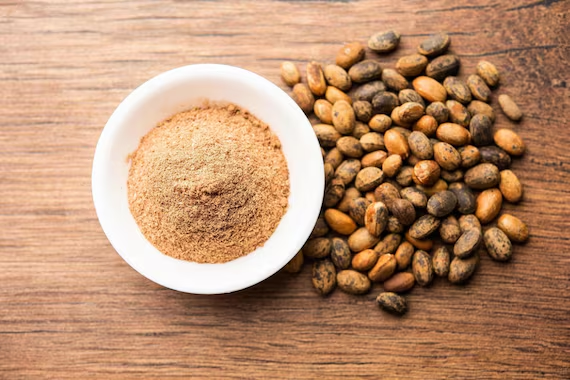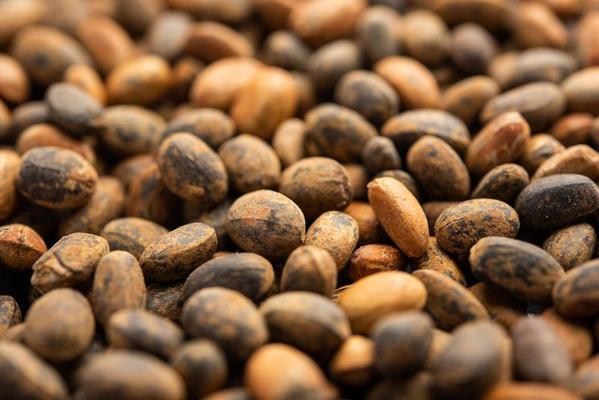INTRODUCTION:

Croton seeds, primarily from the species Croton tiligum are known for their potent purgative and medicinal properties, particularly in traditional medicine systems like Ayurveda and Chinese medicine. These seeds, also known as Jamalgota in some regions, are recognized for their ability to induce bowel movements and treat conditions like constipation. However, they are also known to be toxic and require careful handling and detoxification before use.
English: Jamalgota seed / Purging croton seed
Hindi: जमालगोटा का बीज (Jamalgota ka beej)
Urdu: جمالگوٹا کا بیج
Sanskrit: कनकबीज (Kanakabeeja) / कृष्णबीज
Punjabi :ਜਮਾਲਗੋਟਾ ਦੇ ਬੀ
Bengali: জামালগোটা বীজ (Jamalgota bīj)
Gujarati: જમાલગોટા બીજ
Marathi: जमालगोटा बियाणे

HEALTH BENIFITS:
Gastrointestinal Issues:
Croton seeds have been used traditionally to address constipation, abdominal pain, and other digestive problems.
Purgative Effects:
They can induce a strong purgative action, which can be helpful in clearing the bowels, but also necessitates caution due to their potential to cause inflammation and other adverse effects.
Anti-inflammatory Properties:
Some studies suggest that croton seeds may have anti-inflammatory effects.
Strong Laxative (Purgative)
Used in traditional medicine to treat severe constipation.
Cleanses the intestines by causing forceful bowel movements.
Anti-parasitic
Traditionally used to expel intestinal worms due to its toxicity to parasites.
Skin Conditions
In very small, processed doses, sometimes used externally to treat skin diseases like eczema and ringworm.
Joint Pain Relief (External Use)
Oil derived from the seeds is used topically in some cultures to relieve arthritis and joint pain.
Detoxification (Shodhana in Ayurveda)
Used in Ayurvedic purification therapies under expert supervision.
SIDE EFFECTS:

When taken by mouth: Croton seeds and oil are unsafe when taken by mouth. A few drops of croton seed oil can cause death. Croton seeds and oil can cause burning of the mouth, vomiting, dizziness, painful bowel movements, and collapse.
When applied to the skin: Croton seeds and oil are unsafe when applied to the skin. If croton seed oil is put on the skin, it can cause itching, burning, and blistering.
When we take over dose may cause :
Diarrhoea
- Severe cramps
- Abdominal tenderness
- Burning sensation in the abdomen
- Ulcers
- Vomiting
- Dizziness
How to use:

1. Use Only After Proper Purification (Shodhana)
Raw seeds contain croton oil, a powerful irritant and toxin.
Traditional Detoxification (Shodhana) includes
Soaking seeds in cow milk or ginger juice for 3–5 days
Removing outer shell and inner kernel
Boiling and drying
Roasting lightly over low flame
Then powdering into a fine dust
Only use Shuddha Jamalgota (purified seeds). These are sometimes available at certified Ayurvedic pharmacies.
2. Recommended Safe Dosage (Post-Purification)
Purified Jamalgota Powder: 10–30 mg only, once a day
Max dose: NEVER exceed 30 mg
Administered with:
Ghee (clarified butter)
Honey
Castor oil (optional, enhances purgation)
Never take it on an empty stomach. Avoid spicy, oily foods before and after.
3. Best Time to Take
Early morning, after a light meal (if prescribed as a purgative)
Drink warm water afterward to assist bowel movement
4. Monitor Effects Carefully
Expect 1–2 bowel movements (mild purge)
Avoid if you have diarrhea, dehydration, or any weakness
Rest, rehydrate, and eat light food after purgation
5. Who Should Avoid It Completely
Pregnant or breastfeeding women
Children and elderly
People with:
Heart disease
Kidney or liver disease
Ulcers or colitis
Low immunity




